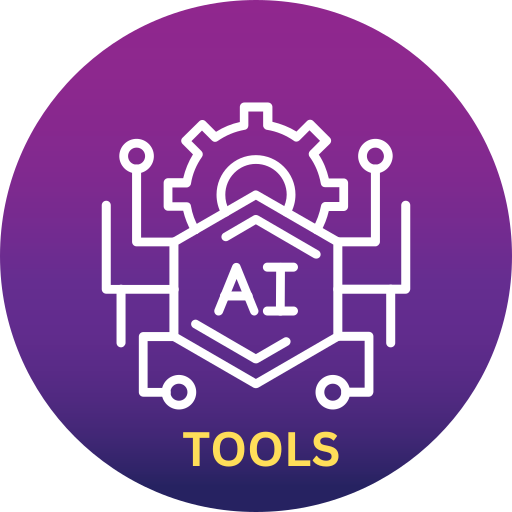The goal of AI Legal Tools is to improve data organization, lower the possibility of contractual disputes, and assist lawyers in drafting contracts.
AI Legal Tools streamline the drafting process, reduce time, and increase efficiency for legal professionals by analyzing previous documents, identifying crucial terms, and providing relevant legal contract templates in seconds.
Additionally, AI-powered software aids in reviewing and revising existing data, ensuring accuracy and mitigating potential risks associated with contract discrepancies. By revolutionizing the legal workflow, AI legal drafting tools improve productivity, reduce risk, and manage contracts more effectively.
What Are the Best AI Legal Tools?
The legal industry has a lot of repetitive tasks that take a long time to complete. Artificial intelligence ventures are emerging in the field. Using time wisely and strategically is one of the most valuable assets of a lawyer. It costs legal professionals so much time to perform mundane administrative tasks like drafting motions, making phone calls, billing, marketing, revising documents, etc. The law is very strict in its formal setting, so entrusting legal work entirely to a computer raises questions about accuracy.
Artificial intelligence is still evolving and is backed by human intelligence. AI used in legal software and tools relies on machine learning and natural language processing and is backed by human intelligence. Clients can also check and verify references from relevant and credible sources.
There are many features that need to be considered when choosing an AI legal assistant, just like AI in other fields:
1. AI Lawyer:
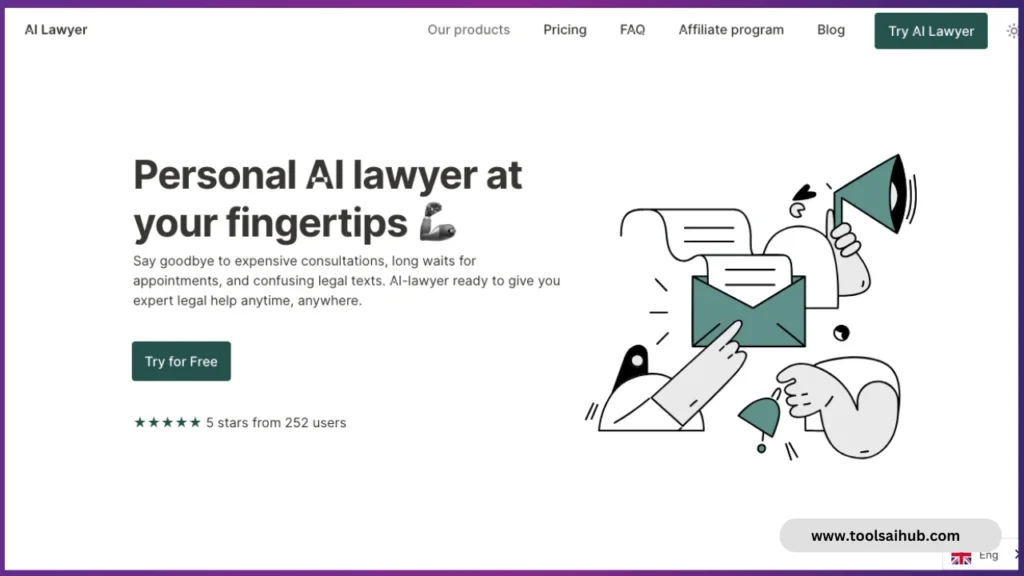
The Artificial Intelligence Lawyer, also known as the AI Lawyer, uses artificial intelligence and machine learning algorithms to provide legal assistance and support. Through automation of various legal tasks, enhanced efficiency, and cost-effective legal solutions, this innovative use of artificial intelligence can revolutionize the legal industry.
Features of AI Lawyer:
Legal Research and Analysis: Lawyers can build stronger cases using AI Lawyer’s accurate and up-to-date analysis of legal documents, cases, statutes, and precedents.
Document Drafting: Documents, contracts, and agreements can be generated with high precision, reducing the time, effort, and error risk associated with manual drafting.
Contract Review: AI Lawyer can review contracts and highlight potential issues, discrepancies, or areas of concern, ensuring compliance and reducing legal risks for businesses.
Case Prediction: Using historical data and machine learning algorithms, AI Lawyer can predict case outcomes and provide valuable insights into litigation strategies.
Chatbots for Legal Queries: Some AI Lawyer platforms feature chatbots that can answer basic legal questions, provide information about legal processes, and offer initial guidance to individuals seeking legal assistance.
Due Diligence Automation: AI Lawyer can streamline due diligence processes in mergers and acquisitions, flagging potential issues and saving time during complex transactions.
Pros of AI Lawyer:
Efficiency: AI Lawyer streamlines legal research, document review, and drafting, so lawyers can concentrate on more productive tasks.
Cost Savings: AI Lawyer reduces operational costs and legal fees by automating routine tasks.
Accuracy: Its algorithms are designed to minimize human error, ensuring that legal analysis and documents are accurate and consistent.
24/7 Availability: AI Lawyer platforms can be accessed around the clock, providing immediate assistance and answers to legal queries, which can be particularly beneficial in urgent situations.
Scalability: Law firms and legal departments can scale their operations more easily by integrating AI Lawyer into their workflow, handling larger caseloads efficiently.
Cons of AI Lawyer:
Limited Creativity: AI Lawyer excels at routine and data-driven tasks but may struggle with creative legal strategies or highly nuanced cases that require deep legal expertise.
Privacy Concerns: Handling sensitive legal information through AI raises concerns about data privacy and security, necessitating robust data protection measures.
Initial Setup Costs: Implementing AI Lawyer systems can be expensive, requiring investments in software, hardware, and staff training.
Lack of Human Touch: Some clients may prefer a human lawyer for the personalized touch and empathy, which AI Lawyer may struggle to replicate.
Ongoing Maintenance: AI Lawyer systems require regular updates and maintenance to remain effective and adapt to changing legal regulations and standards.
2. PatentPal:
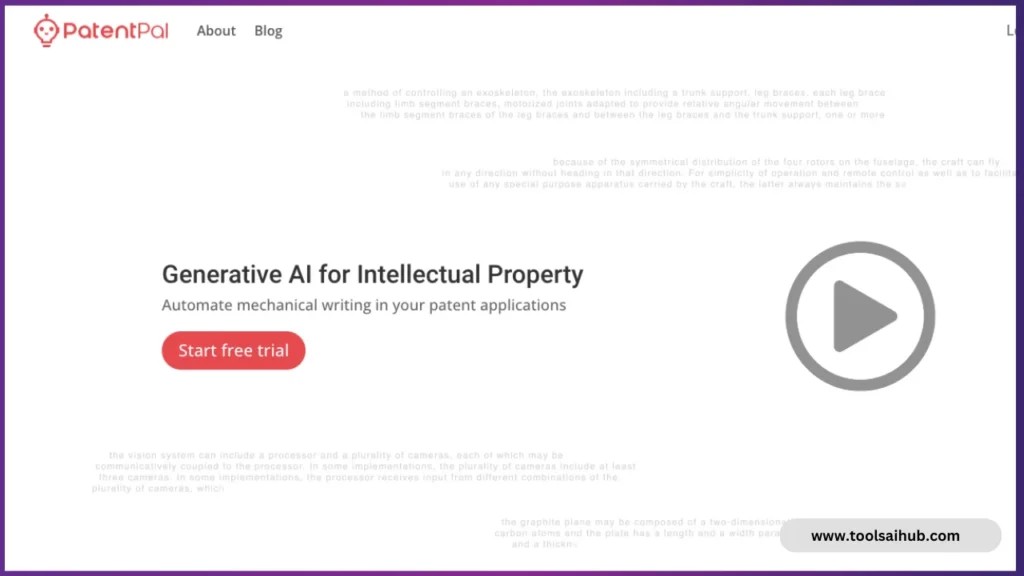
PatentPal is a leading intellectual property management platform that offers a comprehensive suite of tools and services to assist individuals, businesses, and organizations in managing their patent portfolios and making informed decisions regarding patents and intellectual property. It streamlines the process of managing, analyzing, and protecting patents through the use of technology.
Features of PatentPal:
Patent Portfolio Management: PatentPal offers users an easy-to-use and centralized interface for managing their patent portfolio, tracking applications, grants, and expiration dates, ensuring timely maintenance fee payments.
Patent Search and Analysis: Patent search capabilities on the platform allow users to conduct in-depth searches and analyze patent landscapes to assess the competitive landscape and identify potential opportunities.
Prior Art Search: PatentPal’s advanced search capabilities facilitate comprehensive prior art searches, assisting patent professionals in evaluating invention novelty and patentability.
Patent Monitoring and Alerts: Customized alerts can be set up to stay informed about patent status changes, competitor filings, or other patent-related developments that could affect a user’s intellectual property strategy.
Patent Valuation: The PatentPal tool provides tools for estimating patent values, which can be crucial for licensing negotiations or mergers and acquisitions.
Collaboration and Communication: By facilitating the sharing of patent information and notes, the platform facilitates seamless collaboration between team members and external partners.
Document Management: It is easy to access and share patent-related documents because users can upload, organize, and securely store them.
Pros of PatentPal:
Efficiency: Users save time and reduce administrative burdens by using PatentPal to manage and analyze patents.
Informed Decision-Making: It provides valuable insights into patent strategies, licensing, and enforcement, allowing users to make informed decisions.
Cost Savings: PatentPal can help users save money in the long run by optimizing patent portfolio management and avoiding costly mistakes.
Customization: Users can tailor the platform to their specific needs, ensuring that it aligns with their intellectual property management objectives.
Compliance: PatentPal assists users in maintaining and renewing their patents, reducing the chance of losing valuable patents by not staying on top of maintenance and renewal requirements.
Cons of PatentPal:
Cost: While PatentPal can save money in the long term, there may be initial costs associated with subscribing to the platform and training users.
Learning Curve: Users who are new to patent management software may face a learning curve while adapting to the platform’s features and capabilities.
Dependence on Data Accuracy: The effectiveness of PatentPal relies on the accuracy of the patent data it uses, and errors or omissions in external databases can affect the quality of search results and analysis.
Integration Challenges: Integrating PatentPal with existing internal systems and workflows may require technical expertise and effort.
3. ChatGPT For Lawyers:
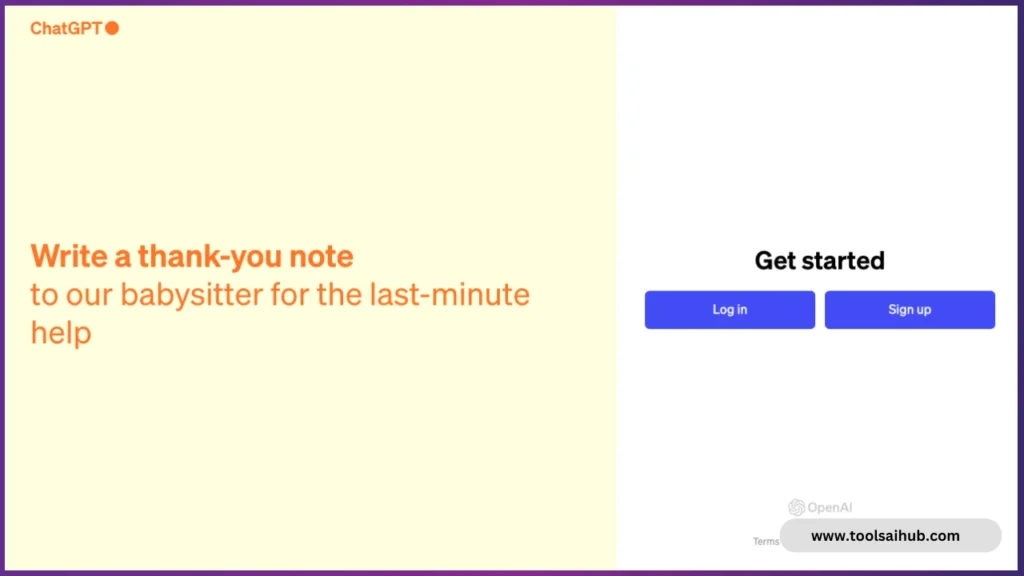
ChatGPT, developed by OpenAI, is an advanced artificial intelligence language model designed to assist professionals and individuals across various industries, including the legal field. Lawyers’ productivity, research capabilities, and interactions with clients can be enhanced using this AI-powered tool.
Features and Applications for Lawyers:
Legal Research: ChatGPT can conduct rapid and extensive legal research by sifting through vast volumes of legal documents, case law, statutes, and precedents. Lawyers can find relevant information quickly and efficiently, saving time.
Document Drafting and Review: Lawyers can utilize ChatGPT to generate initial drafts of legal documents, contracts, briefs, and agreements. AI can also flag potential issues and suggest revisions for clarity and accuracy in documents.
Legal Analysis: It can help legal professionals gain a better understanding and interpretation of legal principles by processing complex legal concepts and offering explanations.
Client Communication: Artificial intelligence allows lawyers to use ChatGPT to create clear, concise, and legally sound emails, responses to client inquiries, and legal memos.
Case Strategy and Prediction: An attorney can formulate informed litigation or negotiation strategies based on ChatGPT’s analysis of historical case data.
Pros for Lawyers:
Efficiency: ChatGPT accelerates legal research and document drafting, allowing lawyers to focus more on critical tasks that require their expertise.
Cost Savings: By automating routine legal tasks, ChatGPT can help law firms reduce operational costs and offer competitive pricing to clients.
Access to Legal Knowledge: Legal professionals and junior lawyers dealing with unfamiliar areas of law can benefit from ChatGPT’s instant access to legal knowledge.
Consistency: The AI ensures that legal documents and communication are consistent and free from human errors, minimizing legal risks.
24/7 Availability: Lawyers can use ChatGPT 24 hours a day, 7 days a week for urgent legal matters.
Cons for Lawyers:
Limitations in Complex Cases: While ChatGPT is a valuable tool, it may have limitations in handling highly complex or nuanced legal cases that require extensive legal expertise and judgment.
Data Security: Lawyers must be cautious when using AI for legal work, as it involves handling sensitive and confidential client information. Robust data security measures are necessary to protect client privacy.
Initial Learning Curve: Lawyers may need some time to become proficient in using ChatGPT effectively and integrating it into their workflow.
Ethical Considerations: Artificial intelligence is being used in law to raise ethical concerns about human judgment, accountability, and potential biases.
4. Humata AI:
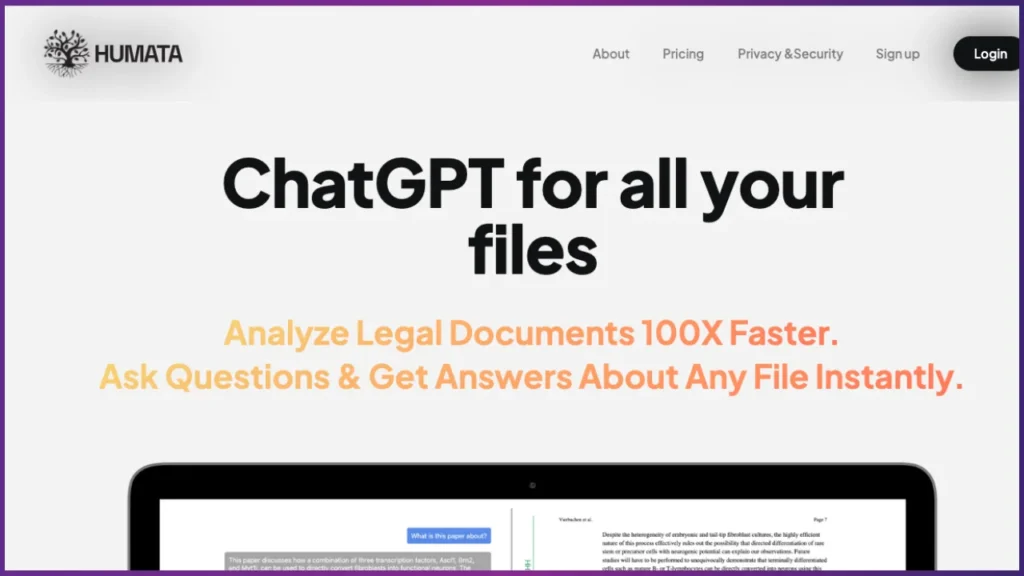
A unique AI tool designed specifically for lawyers and legal professionals, Humata AI addresses the unique needs of lawyers. As an assistant to the legal industry, it provides rapid access to information, automates legal research, simplifies report preparation, and streamlines the analysis of legal documents.
Features of Humata AI for Lawyers:
Rapid Legal Research: Humata AI accelerates legal research by swiftly searching through extensive legal databases, statutes, case law, and precedents, providing prompt and relevant answers to legal queries.
Learning and Knowledge Acquisition: Legal professionals can leverage Humata AI to deepen their understanding of complex legal concepts through AI-powered explanations and insights.
Report Generation: The tool simplifies report creation by automatically compiling information from various sources, enabling lawyers to generate comprehensive reports for cases, clients, or research.
Document Analysis: Humata AI excels in document analysis, reviewing legal documents, contracts, agreements, and briefs. It extracts key information, identifies potential issues, and highlights critical clauses.
Data Extraction: Lawyers can quickly and accurately extract essential data points from diverse legal documents, enhancing efficiency, particularly in due diligence processes.
Pros of Humata AI for Lawyers:
Enhanced Efficiency: Humata AI significantly speeds up legal research and document analysis, allowing lawyers to manage their caseloads more efficiently.
Time Savings: The tool’s ability to summarize, synthesize, and extract data from legal documents saves lawyers valuable time, enabling them to focus on higher-value tasks.
Comprehensive Knowledge: Humata AI provides access to a vast repository of legal knowledge, helping legal professionals stay updated on legal developments and precedents.
Error Reduction: AI’s consistency and accuracy in document analysis contribute to reduced risks of human errors in legal work.
Client Service: With the time saved using Humata AI, lawyers can provide faster and more responsive service to their clients, improving client satisfaction.
Cons of Humata AI for Lawyers:
Data Security: Ensuring compliance with data security and privacy regulations is crucial, particularly when handling sensitive client information through AI tools like Humata.
Integration Challenges: Implementing AI tools may require adjustments to existing workflows and processes, necessitating some adaptation from legal professionals.
Human Judgment: While Humata AI is a powerful assistant, it should complement, rather than replace, the essential human judgment and legal expertise that lawyers bring to their work.
5. Activazon:

Crime report analytics from Activazon empower residents and visitors to make informed decisions based on information about crimes happening in their neighborhoods. Legal professionals working on cases involving criminal activity in particular locales can benefit from Activazon, which is not specifically designed for them. Through its insights into local crime trends and patterns, Activazon plays an important role in strengthening legal strategies and enhancing situational awareness.
Key Features of Activazon:
Real-Time Crime Data: Activazon aggregates and presents real-time crime data, including incident reports, arrests, and other relevant information, to keep users informed about safety conditions in their communities.
Interactive Mapping: The platform utilizes interactive maps to pinpoint crime occurrences, allowing users to visualize crime hotspots and patterns within specific areas.
Customized Alerts: Users can set up personalized alerts for their neighborhoods or areas of interest, receiving notifications when specific types of crimes or incidents occur nearby.
Crime Trend Analysis: Activazon offers tools for tracking and analyzing crime trends over time, helping users understand changes in local safety conditions.
Community Engagement: Platforms often offer features to engage the community, such as reporting suspicious activities and sharing safety tips.
Pros of Activazon:
Enhanced Safety Awareness: Activazon empowers residents and visitors to stay informed about their surroundings, promoting a sense of safety and community awareness.
Crime Prevention: Crime data and alerts are available in real-time, enabling proactive measures that can reduce the chances of becoming a victim.
Useful for Legal Cases: Lawyers can leverage Activazon to gather relevant crime data, patterns, and trends that may strengthen their legal cases, particularly those involving criminal activity in specific areas.
Community Collaboration: The platform fosters collaboration and information-sharing among community members, creating a more connected and vigilant neighborhood.
Cons of Activazon:
Privacy Concerns: The collection and dissemination of crime data may raise privacy concerns among some users, particularly if it includes sensitive information.
Data Accuracy: The accuracy of crime data relies on the quality and timeliness of information provided by law enforcement agencies, which can vary.
Limited Legal Focus: Activazon is primarily designed for community safety and awareness, and its crime data may not be as comprehensive or specialized as data sources used in legal investigations.
Overreliance on Technology: There is a risk that users may become overly reliant on technology for their safety, potentially leading to complacency in taking personal safety precautions.
Related Content
- Paralegal AI Guide: Overview, Features, Advantages, and Limitations
- Casetext Explained: A Comprehensive Guide to Features, Pros, Cons, and How to Use It
- Top 4 Essential Legal AI Tools Every Lawyer Needs to Know
Conclusion
AI legal tools are transforming the way legal professionals work, offering smarter, faster, and more efficient solutions for research, contract analysis, case management, and more. By integrating these cutting-edge tools into your workflow, you can save time, reduce errors, and enhance productivity.
As AI technology continues to evolve, staying ahead with the right tools will give you a competitive edge in the legal industry. Try these must-have AI legal tools in 2025 and experience the future of legal work today!
